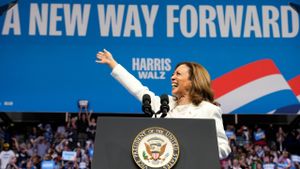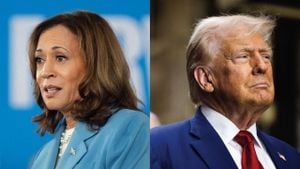It's been nearly six decades of rule, but come November 2024, Botswana's political climate has dramatically shifted. The atmosphere was electric as voters headed to the polls, ready to cast their votes for change. The results declared the small African nation's ruling party, the Botswana Democratic Party (BDP), defeated by the opposition coalition led by Duma Boko.
This transition marks the first time the BDP, which has governed since the country’s independence from Britain in 1966, has conceded power. It was a historic loss for the party, with outgoing President Mokgweetsi Masisi conceding defeat even before the official tally was fully confirmed.
“I concede the election,” Masisi said during his early morning news conference, where he faced the media just days following the conclusion of the ballot. He emphasized the importance of Botswana's democratic processes and committed to ensuring a smooth transition. “Although I wanted a second term, I will respectfully step aside,” he added, pointing out his intention to support his successor.
The Independent Electoral Commission (IEC) indicated Brazil's political transformation had solidified, with the opposition Umbrella for Democratic Change (UDC) garnering the requisite 31 seats to take control over the 61-seat legislature. The BDP had fallen to fourth place, trailing behind the UDC, Botswana Congress Party, and Botswana Patriotic Front, which shocked many observers who had anticipated the party would clinch victory once again.
For Duma Boko, 54, this achievement came after years of effort—he previously contested elections in 2014 and 2019. A graduate of Harvard Law School and known for his background as a human rights lawyer, Boko's approach to leadership has involved rallying various opposition groups to unify their voice against the longstanding BDP rule.
Upon his victory announcement, Boko shared on social media, proclaiming “Botswana First” beside his campaign message: “Change is Here.” His tone was filled with humility as he acknowledged the significant responsibility placed upon his shoulders, pledging to the public, “I will do everything I can, not to fail, not to disappoint.”
Chief Justice Terence Rannowane took on the ceremonial role of announcing Boko’s electoral success, emphasizing the confidence shown by the people. “I congratulate you for the confidence the people have shown in you,” he said, formalizing the leadership change. Following the declaration, Boko was swiftly sworn in during an official ceremony, marking the dawn of what is expected to be policy shifts addressing pressing issues like economic challenges.
Historically, Botswana has been touted as one of Africa's most stable democracies and has repeatedly been held up as a model for post-colonial success. Under the BDP’s governance, the nation has developed one of the highest standards of living on the continent, primarily through diamond mining, evidenced by Botswana being the second-largest diamond producer globally after Russia.
Yet, this success has come with its own baggage. The rise of unemployment, currently exceeding 27%, particularly among the youth, has generated unrest and calls for change. Many citizens feel the government failed to diversify its economy away from its heavy reliance on diamonds, which constitute over 80% of exports and account for about 25% of the GDP. Due to declining global demand for diamonds, Botswana now faces economic austerity measures.
Just before the election, Masisi acknowledged this issue, stating there was pressure to develop alternative economic drivers, such as agriculture and tourism. Reportedly, the BDP's lack of new policy proposals did not resonate with voters, with Ringisai Chikohomero, of the Institute for Security Studies, stating, "It was very clear the president was really relying on incumbency,” as opposed to innovative ideas to capture the electorate's attention.
The importance of the election was underscored by voter turnout, where over one million citizens registered to voice their opinions during the election, within the broader population of approximately 2.6 million. People were disillusioned, opting to place their faith in the UDC instead of the long-established BDP.
Boko’s campaign focused on ambitious reforms—a promise to raise the minimum wage and improve social services alongside fostering judicial independence. These points appealed to many who felt marginalized under the previous administration’s policies.
Looking forward, Botswana stands at the threshold of change. Masisi expressed optimism about the democratic process, saying, “I look forward to attending the coming inauguration and cheering on my successor.” This sentiment reflects how the political environment, usually rife with tension during elections, can embrace courtesy during transitions.
While the newly elected government will face significant challenges, including job creation and economic diversification, many Batswana are hopeful. They anticipate renewed attention to economic matters and social change as their country turns the page on its political narrative.
Botswana's future hinges on how effectively the new administration can engage with these issues as they seek to restore economic stability and public confidence. For now, the nation collectively holds its breath, hoping Duma Boko and the UDC will usher them toward brighter prospects.



